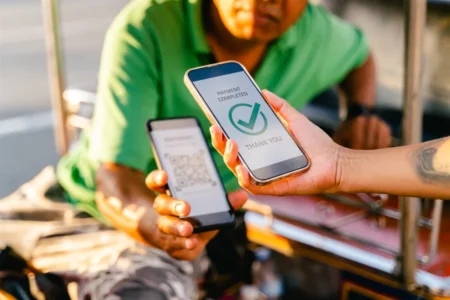- The digital revolution in Africa is propelling various sectors into new realms of potential, and the gaming industry is no exception.
- Blockchain technology has the potential to benefit both game producers and players by offering a safe and transparent method of handling in-game transactions.
- African game developers have opted to look at incorporating new technologies into the games they offer, such as allowing players to use Bitcoin and blockchain technology while playing.
Africa’s gaming Industry
The digital revolution in Africa is propelling various sectors into new realms of potential, and the gaming industry is no exception. GeoPoll’s latest report, “Gaming in Africa,” explores the burgeoning gaming scene across Egypt, Kenya, Nigeria, and South Africa.
The African gaming industry is emerging as the fastest-growing for mobile gaming, driven by a young population, increasing smartphone adoption and a burgeoning interest in mobile games.
Africa is the final frontier for the video game industry. Over the past few years, gaming has become the dominant form of entertainment globally, grossing nearly $350 billion worldwide in 2023, according to one industry executive.
With the last decade’s rise of mobile gaming, the sector is now bigger than movies, music, and streaming combined, moving the industry’s audience beyond former archetypical customers of US-based adolescent boys who could afford the relatively pricey gaming console.
This year, Africa solidified itself as the fastest-growing market for the mobile games industry. That is hardly surprising, given demographic trends in the region. The continent has the fastest-growing population in the world, with more of it classed as millennials or Generation Z than the United States and China combined.
By 2050, 25 per cent of the world’s population is expected to be African. Combine that with the rapid adoption of smartphones, and you can see strong organic growth of new gamers engaging with popular mobile games such as Call of Duty Mobile, FC Mobile, or Clash of Clans.
Serving this new generation of players still presents challenges. For example, just 3.92 per cent of Africa’s population can access a credit card. However, herein lies fintech’s transformative potential for gaming and financial inclusion continent-wide.
Read Also: Bridging the digital divide in Africa to propel economic growth
Developers creating African-themed games

With even localised African features, including characters and assets. Developers are including new elements like ownership to leverage blockchain technology.
A Social Impact gaming company based in Kenya, Usiku Games Africa, is pioneering the new age of blockchain gaming in the country so that tech-savvy youths may soon begin to profit as the gaming industry continues to grow.
Now, with the introduction of GameFi – a phase in the crypto that merges the best parts of gaming and decentralised finance – players engage with the game and, in return, receive non-fungible tokens (NFT) and cryptocurrency rewards they can cash out for profit. So, the more you play, the more rewards you get.
Developers consider blockchain-based games
As cryptocurrency adoption goes mainstream, the growth of blockchain gaming in the continent is inevitable.
A survey shows that 38 per cent of the 41.9 million of the world’s crypto-holding gamers (aged between 21 and 38) are the reason behind the increasing interest in trading in gaming, utilising crypto and digital currency. Cryptocurrency has tremendous potential for getting involved in the game sector. It was reported that 80 per cent of gamers with blockchain wallets are willing to purchase gaming tokens with their digital currencies.
With 5.9 million gamers owning cryptocurrencies across Africa and the Middle East, Africa’s numbers could skyrocket since the continent is expected to have the most enormous youth population by 2050.
African game developers have opted to look at incorporating new technologies into the games they offer, such as allowing players to use Bitcoin and blockchain technology while playing. Indeed, this has resulted from the continent’s ongoing increase in tech-savvy individuals, and it may allow participants to profit financially from the surge.
Now, with Binance play-to-earn, every gamer can monetise their playing time via buying and selling in-game NFTs or completing objectives in exchange for cryptocurrency rewards. To learn more, you can go through our guide on getting crypto and NFTs via play-to-earn.
Players can also trade their hard-earned tokens on cryptocurrency exchanges like Binance to earn even more. NFT-based games that have their native token.
Read Also: Bridging the digital divide in Africa to propel economic growth
The digital revolution progress in Africa
The gaming industry’s expansion is increasingly on an upward trend. Over the last five years, the number of video gamers on the continent has more than doubled, with South Africa taking the lead.
In the last five years, video gaming has continually evolved as more Africans become active in the gaming space. Now, gamers can easily access games on their mobile phones and computers.
The Coronavirus pandemic aided the adoption of this hobby as it kept many people locked indoors and made gaming one of the most preferred and accessible activities to maintain connection and keep boredom at bay.
Progress has moved from consoles to smartphones, with Africa’s increasingly tech-savvy youths in this multi-million dollar gaming industry. With the increasing adoption of digital currencies, Africa is set to lead the gaming revolution.
Inspiring new and original gameplay might come from Africa’s varied and rich cultural heritage. Using local myths, tales, and stories, game designers may make games more relevant to the African market.
The number of skilled African programmers, artists, and designers enthusiastic about the video game industry constantly expands. Many gaming companies on the continent are now making games for the international market, allowing locals to enter the industry.
The gaming industry in Africa is booming because of the continent’s sizable and young population. In light of this, it’s time for game designers to make games specifically for the African market and the preferences of African players.
Cryptocurrency adoption and gaming in Africa

Blockchain technology has the potential to benefit both game producers and players by offering a safe and transparent method of handling in-game transactions.
If you want to attract foreign players and investors to Africa’s gaming business, consider incorporating cryptocurrency into games.
Currently, 63 million out of the 186 million players pay for games. As the continent begins to accept digital currencies, these African figures are expected to be the fastest-growing in the world.
With Global crypto gaming valued at 321 million US dollars as of 2020, 80 per cent of gamers with crypto accounts are willing to use digital currency for gaming purchases, and 67 per cent are interested in using cryptocurrency in gaming.
Following the debut of Africa’s first Central Bank-backed digital currency, the e-Naira, in 2021, Nigeria has jumped ahead of its African rivals in cryptocurrency adoption. Although Kenya has yet to develop its regulated digital currency, it leads the globe in peer-to-peer cryptocurrency exchange.
South Africa is now in the testing stage of its Dunbar project, which will facilitate cross-border payments with Mauritius while moving closer to the development stage. Ghana appears to be considering implementing regulations for digital currency in the future, with the African country, along with Tunisia, Morocco, and a few other countries, still researching the idea of digital currencies.
Conclusion
Africa is a promising and rapidly developing market for the gaming industry. Some promising sub-sectors of the gaming business include mobile gaming, Esports, game creation, VR, and crypto integration. An increasing number of young people, a diverse cultural heritage, and a wealth of skills.
Programmers, artists, and designers make Africa a promising market for video game creators. Some African governments see the sector’s potential and actively encourage its expansion. The sector’s continued growth could lead to employment possibilities, innovation, and global exposure to Africa’s unique culture and landscapes.











